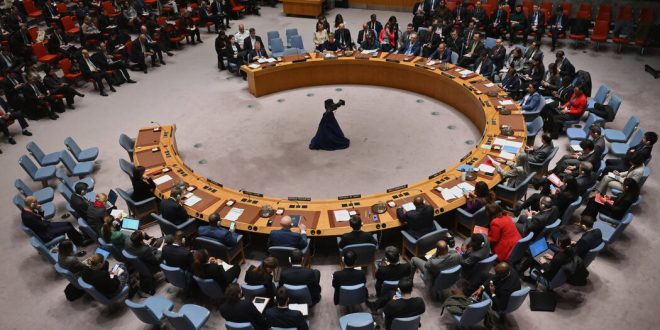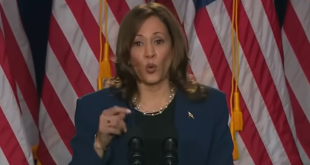A U.S. bid to have the U.N. Security Council call for “an immediate and sustained cease-fire” in the Gaza Strip failed on Friday, after Russia and China vetoed the American resolution that included some of Washington’s strongest language since the start of the war.
The resolution reflected the Biden administration’s growing frustration both with the dire humanitarian crisis in Gaza and Israel’s conduct in a war that has killed about 30,000 people and reduced much of the enclave to ruins. The administration has been pressuring Israel not to attack the southern Gazan city of Rafah, where more than a million civilians have sought refuge, and to enable more aid to enter the territory.
But international frictions, including over Washington’s previous use of its veto power in the Security Council and its refusal to call for a permanent cease-fire, doomed the resolution. Eleven members voted in favor of the resolution, but Russia and China — permanent members — voted against it, as did Algeria. Guyana abstained.
Secretary of State Antony J. Blinken, who was traveling in Israel on Friday, expressed disappointment that the resolution failed.
“I think we were trying to show the international community a sense of urgency about getting a cease-fire tied to the release of hostages, something that everyone, including the countries that vetoed the resolution, should have been able to get behind,” he said.
Prime Minister Benjamin Netanyahu of Israel reiterated his stance that despite growing international criticism, his country’s ground forces would launch an offensive into Rafah to root out Hamas, the group that led the Oct. 7 assault that precipitated Israel’s invasion of Gaza. The Biden administration has said repeatedly that an incursion into Rafah, which is on the border with Egypt, would cause heavy civilian casualties and impede aid delivery.
“We have no way to defeat Hamas without going into Rafah and eliminating the rest of the battalions there,” Mr. Netanyahu said in a statement on Friday after meeting in Tel Aviv with Mr. Blinken. “And I told him that I hope we will do it with the support of the U.S. But if we must, we will do it alone.”
The U.S. resolution said the Security Council “determines the imperative of an immediate and sustained cease-fire.” Representatives from the three dissenting countries and Guyana said it did not go far enough in demanding or compelling a cease-fire.
Amar Bendjama, the Algerian ambassador to the United Nations, said a reference in the measure to reducing harm to civilians in “ongoing and future operations” in Gaza implied a “license for continuing bloodshed.”
“The text presented today does not convey a clear message of peace,” Mr. Bendjama said.
After the vote, the U.S. ambassador to the U.N., Linda Thomas-Greenfield, defended the resolution, which condemned Hamas, saying that it had been brought forward “in good faith after consulting with all Council members and after multiple rounds of edits.”
She said Russia and China had vetoed the resolution for two reasons: They refused to condemn Hamas and they “simply did not want to vote for a resolution that was penned by the United States because it would rather see us fail than to see this Council succeed.”
Whether or not Russia and China were motivated by a desire to thwart or embarrass the United States, it is clear that their relations with Washington are as hostile as they have ever been in decades, with conflicts over a host of issues, including Russia’s invasion of Ukraine, China’s designs on Taiwan, economic sanctions and trade tariffs. In 2022, Russia vetoed two Security Council resolutions condemning its conduct in Ukraine.
Ms. Thomas-Greenfield said the U.S. draft would have put the Security Council’s weight behind diplomatic efforts “to secure an immediate and sustained cease-fire as part of a deal that leads to the release of all hostages” and “allow much more humanitarian aid to get into Gaza.”
Russia’s ambassador to the United Nations, Vasily Nebenzya, had denounced the U.S.-backed measure before the vote, calling it a “hypocritical initiative” and “a diluted formulation” regarding a cease-fire.
“To save the lives of peaceful Palestinians, this is not enough,” he said. The draft, he asserted, was written with U.S. political interests in mind, to “play to the voters, to throw them a bone.”
He urged Council members to vote against the resolution, saying, “We cannot allow the Security Council to become an instrument in advancement of Washington’s destructive policy in the Middle East.”
The United States had vetoed three previous resolutions demanding a stop to the fighting in Gaza, arguing that the measures could disrupt hostage negotiations and staunchly defending Israel’s right to defend itself after the Hamas-led attack of Oct. 7. In each of those earlier Security Council votes, the United States cast the only one against the resolutions. Russia and Britain abstained from the first vote, in October, and Britain abstained from the votes in December and February.
But as the death toll has increased in Gaza, and as hunger and disease have worsen across the territory, President Biden and other U.S. officials have grown increasingly critical of Mr. Netanyahu and his handling of the war, calling on him to let more aid into Gaza and to do more to protect civilians.
After meeting on Friday with Mr. Netanyahu and members of his war cabinet, Mr. Blinken said at a news conference that an immediate cease-fire would allow for the release of hostages and for “surging” humanitarian aid to alleviate the acute suffering among the territory’s 2.2 million civilians.
Mr. Blinken, concluding his sixth Middle East trip since the war began, warned that a major military ground operation in Rafah was not how to ensure Israel’s long-term security.
“It risks further isolating Israel around the world and jeopardizing its long-term security and standing,” he said, adding that U.S. officials were looking forward to meeting with Israeli officials in Washington next week “to talk about a different way of achieving those objectives.”
Mr. Netanyahu said in his statement that Israel recognized the need to protect civilians and ensure humanitarian aid for Gaza but was determined to proceed with the planned incursion.
Benny Gantz, Mr. Netanyahu’s chief political rival, appeared to endorse that position, saying in a statement that Israel must “dismantle Hamas’s military infrastructure, including in Rafah.” Mr. Gantz, an opposition leader who crossed parliamentary lines to join the war cabinet, thanked Mr. Blinken “for his support for Israel and the deep American commitment to its security.”
U.S. officials said that they believed no operation into Rafah by the Israeli military was imminent, giving the United States time to either help cement a hostage deal that would put in place a temporary cease-fire or propose other options to the Israelis at meetings next week.
Israel is not yet prepared to push its forces into Rafah, which will be a difficult ground operation to pull off, they said.
As the secretary of state made the last stop of a multileg Middle Eastern tour, William J. Burns, the C.I.A. director, was traveling to Qatar to join talks aimed at reaching a deal between Israel and Hamas that would begin a time-limited cease-fire and an exchange of Palestinians imprisoned by Israel for Israeli hostages held in Gaza.
Speaking to reporters in Cairo on Thursday, Mr. Blinken said that gaps between the Hamas and Israeli negotiating positions were “narrowing,” but that striking a deal would be difficult.
Julian E. Barnes contributed reporting.
 Top Naija News – Nigeria News, Nigerian News & Top Stories Top Naija News – Nigerian Newspapers, Nigerian News. topnaijanews is a daily Nigerian newspaper covering Latest News, Breaking News, Entertainment, Sports, Lifestyle and Politics.
Top Naija News – Nigeria News, Nigerian News & Top Stories Top Naija News – Nigerian Newspapers, Nigerian News. topnaijanews is a daily Nigerian newspaper covering Latest News, Breaking News, Entertainment, Sports, Lifestyle and Politics.




